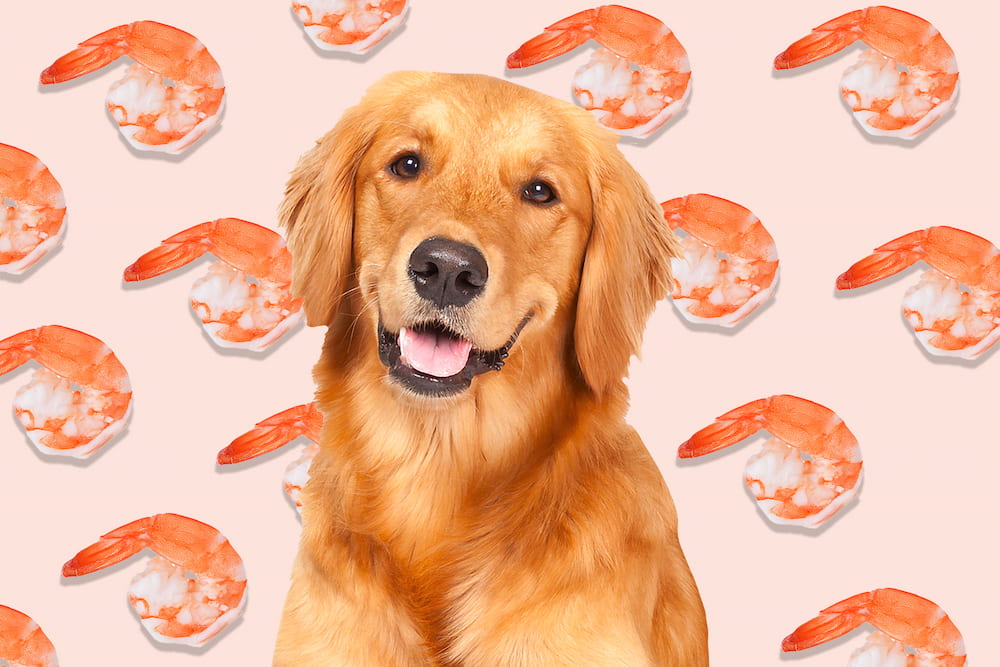
Can Dogs Eat Shrimp? Yes Or No? Dog Food Tips
Can dogs eat shrimp? Yes, provided they are prepared and cooked properly. Shrimp are a tasty treat that your dog will enjoy, and they also have some health advantages.
Before adding any new foods to your pet’s diet, we always advise consulting your veterinarian; this goes for treats as well. Just like people, dogs can have food sensitivities to shellfish, so before approving anything, your veterinarian may suggest an allergy test.
If your dog reacts poorly to shrimp, call pet poison control or your veterinarian right away.
Please continue reading for more information.
Table of Contents
Can Dogs Eat Shrimp?
Shrimp is a food that is well known to most people. It is regarded as a delectable addition to all kinds of food, including pasta, and is frequently eaten by itself with seasonings like garlic and butter. The Encyclopedia Britannica states that many different species of shrimp are frequently consumed as food. Prawns are the name for the larger variations.
The most consumed seafood in the country is shrimp. According to one source, the typical consumer eats about four pounds of shrimp annually. However, what about canines? Your dog may occasionally enjoy a treat of cooked shrimp meat. But when it comes to shrimp for dogs (and cats and people, too! ), there are a few common sense food safety suggestions to remember.). Except in the cases described here, is shrimp bad for dogs?
In general, dogs can eat shrimp as long as it is properly cooked. Dogs can, however, develop allergies just like people can. Additionally, there’s a chance that they simply won’t enjoy it very much sometimes!
Can Dogs Consume Shrimp Raw?
Are dogs able to eat raw shrimp? When it comes to vibriosis, did you not get the memo? Uncooked meat can expose you to parasites and foodborne illnesses. Dogs shouldn’t consume raw seafood.
Can Dogs Eat The Shells Or Tails Of Shrimp?
In general, it is not advisable to give your dog shrimp shells or tails. While some dogs may easily chomp down and chew up the shell and tail, they may present a choking hazard or intestinal obstruction issue in other dogs. Additionally, shrimp shells and tails can get caught in between teeth, irritating the gums.
Remove the shells and tails, devein, cook, or freeze-dry the shrimp before giving them to your dog. If your dog unintentionally consumes a shrimp tail or shell, keep an eye on them for 24 hours and call your veterinarian if they exhibit any signs of illness.
Do Dogs Consume Cooked Shrimp?
Don’t give raw shrimp to dogs. The suggested preparation for dogs is boiling, steaming, freeze-drying, or grilling shrimp without any butter, oil, or seasonings. You can give your dog cooked shrimp either warm or chilled.
Shrimp scampi is not a good snack for dogs because of the garlic, which is toxic to dogs, and the butter, which can cause stomach upset, diarrhea, and pancreatitis (painful and life-threatening inflammation of the pancreas). Dogs can eat shrimp prepared for shrimp cocktail without getting sick, but leave out the cocktail sauce!
Can Dogs Eat Shrimp Fried In Oil?
A lot of extra calories from butter and other ingredients are frequently used in battering or cooking fried shrimp. All those fatty calories are not necessary for pets, and consuming too much fat even in a single meal may increase the risk of developing pancreatitis and other health issues.
So, are dogs able to eat fried shrimp? Schmid says go healthy with your cooked shrimp for dogs: “Go for steamed shrimp if you’re feeding your dog.”
A few of the sauces and seasonings that give shrimp more flavor—which you might adore—can be problematic for dogs.
“Some sauces or seasonings also may contain garlic and onions, which are a toxicity concern,” she says. “But in reality, only very small dogs or very large ingestions would likely be a cause for concern.”
Should Dogs Eat Boiling Shrimp?
When shrimp is cooked, can dogs eat them? If the shrimp have been cleaned and shelled, then the answer is yes. Boil the shrimp until it reaches an internal temperature of 145 degrees, as with other cooking techniques. Shrimp should have opaque flesh when they are cooked. If you intend to add spices and seasonings for yourself, set aside a few plain shrimp pieces for your dog.
Shrimp Tails: Safe For Dogs To Eat?
What about shrimp tails for dogs? Shrimp tails shouldn’t be consumed by dogs. Shrimp tails can pose a choking risk to your dog, just like tiny chicken or fish bones. Your dog’s upper GI tract may become irritated by the sharp edges. You can either ask your fishmonger to clean fresh shrimp and remove the tails for you, or you can look for cleaned shrimp in the frozen section of the grocery store.
Should Dogs Eat Shrimp Shells?
The shells of cooked shrimp should also be removed before giving them to your dog. The vein that runs along the shrimp’s back can more easily be extracted after the shell has been removed. Cut the shrimp open with a knife, then remove the vein. The shells are not required to be thrown away. Shells from shrimp can be used to make a delicious seafood stock. When cooked, strain them after boiling them with some vegetables.
Whether as a treat or to add flavor to dog food, you can give your dog some delectable shrimp broth.
Do Dogs Benefit Or Suffer From Shrimp?
There are numerous nutritional advantages to shrimp. Even those omega-3 fatty acids that are found in nutritional supplements for humans and dogs are present in the small sea creature, which is low in calories, high in protein, and even. Dogs may benefit from shrimp. But could shrimp also be harmful to dogs?
“There are no specific dangers for dogs eating shrimp other than the risk of a bacterial infection called vibriosis,” Schmid says.
This disease, which frequently results from eating raw or undercooked seafood, can affect both humans and dogs. But don’t be alarmed; the risk is minimal as long as you cook your preferred fish and seashells.
According to Schmid, gastrointestinal upset is more likely than vibriosis. Vomiting, diarrhea, and discomfort can occur in dogs when eating shrimp or other foods that simply don’t agree with their stomachs.
When Is Shrimp Harmful To Canines?
If the shrimp is raw or undercooked, your dog may not like it. Before giving your dog any seafood, make sure it is thoroughly cooked. Cooking will kill the majority of dangerous microorganisms, such as bacteria, that are present in raw shellfish. Toxins that are not destroyed by cooking can be present in some shellfish.
Though uncommon, eating contaminated shellfish can result in harmful toxic reactions like paralysis, neurological symptoms, and abdominal pain. If you think you may have food poisoning, call your veterinarian right away. Uncooked shrimp are safe for dogs to eat. Never give raw shrimp to your dog. Salmonella and listeria, two disease-causing bacteria, can be present in raw shrimp and other uncooked animal proteins like beef or chicken.
Raw shrimp can pick up bacteria from contaminated surfaces and improper handling even if the shrimp itself is unaffected. The best method for eradicating dangerous bacteria from shrimp is to cook them thoroughly.

Health Benefits Of Shrimp For Dogs
A high-quality protein with few calories and saturated fats is shrimp. It includes vitamins B12 and D, niacin, iron, and other nutrients that are good for your dog’s health. Shrimp can help a dog maintain a healthy weight if it is used as a healthier alternative to processed dog treats.
See more about
- Should I Let My Dog Watch Me Eat?
- Best Dog Food For Great Dane With Diarrhea
- How Long Can A Puppy Go Without Eating?
- 8 Week Old Puppy Not Eating
How Much Shrimp Can Dogs Eat?
There are many overweight or obese cats and dogs in the United States, which can result in health issues. Almost all of the calories that cats and dogs consume should come from a balanced, complete diet made up of pet food that contains all the nutrients they require. Extra treats should make up no more than 10% of a pet’s diet, according to veterinarians.
A small shrimp has about 10 calories, so let’s calculate that. Depending on the breed and size, a dog’s weight can vary greatly, but the World Small Animal Veterinary Association estimates that a 30-pound dog would consume 1,080 to 1,346 calories on average each day. That translates to 108 to 135 calories from treats per day (and yes, deduct those calories from your dog’s daily calorie intake). That amounts to between 10 and 13 small shrimp per day. Not bad!
To make sure your dog doesn’t have any underlying medical conditions or an excessively active (or lazy) lifestyle that would necessitate a calorie intake adjustment, be sure to discuss your diet choices and calorie counts with your veterinarian.
Food allergies are another thing to be aware of. Certain foods can cause allergies in both people and dogs. To make sure you don’t experience any symptoms of an allergic reaction, always test out a food in a very small amount.
Canine Shrimp Allergies
Dogs vary widely, and some canine companions may be allergic to shrimp. Start with a small portion the first time you feed your dog shrimp, and afterward, keep an eye out for any symptoms of illness in your dog.
Signs of shrimp allergies in dogs include:
- Swollen face or muzzle
- Hives (firm bumps all over body that may be itchy)
- Difficulty breathing
- Vomiting
- Diarrhea
If your dog begins to exhibit signs of illness after consuming shrimp, stop feeding it and consult your veterinarian.
Ways To Prepare Shrimp For Dogs
Purchase shrimp that is fresh and doesn’t smell fishy. There shouldn’t be any rips, tears, frost, or ice crystals on the frozen shrimp packaging. 145 degrees Fahrenheit should be reached inside the shrimp after cooking it. When the flesh is opaque and pearly white, you know it’s finished. For dogs, shrimp should be cooked, deveined (the intestinal tract is removed), and taken out of the shell.
Additionally, a lot of the shrimp dishes we like to eat are spiced up with seasonings that your dog might not like. Feed your dog plain, cooked shrimp rather than shrimp prepared with spices (such as Cajun seasoning), garlic, onions, or cocktail sauce with a horseradish base.
Alternatives To Shrimp For Dogs
Let’s say that after feeding shrimp to your dog, he did not respond as favorably as you had hoped. Maybe he doesn’t like it at all! Or maybe you detect symptoms of an allergic reaction. So keep looking for healthier treats for your dog! Here are some recommendations that you should think about.
- Homemade puppy treats
- Apples
- Carrots
Your dog can savor this savory and nourishing treat when cooked and prepared properly. Bear in mind, though, that shells and tails are choking hazards and difficult to digest, and that ingredients that humans frequently eat—like onions and garlic—are poisonous to dogs. Your dog could become ill from batter, breading, or too much salt.
FAQs About Feeding Your Dog Shrimp
What Happpens If My Dog Consumes Shrimp?
Your dog can savor this savory and nourishing treat when cooked and prepared properly. Bear in mind, though, that shells and tails are choking hazards and difficult to digest, and that ingredients that humans frequently eat—like onions and garlic—are poisonous to dogs. Your dog could become ill from batter, breading, or too much salt.
Do Dogs Get Sick From Shrimp?
Although there are a few exceptions, most shrimp won’t make your dog sick. Giving your dog raw or undercooked shrimp can cause digestive problems, such as vomiting and diarrhea. Vibriosis, a severe bacterial infection comparable to cholera, can occur in rare instances when shrimp are improperly cooked.
If you allow your puppy to eat the shrimp’s shell or tail, they might also have digestive issues. These can upset your dog’s stomach and are frequently difficult for them to digest. They also present a choking hazard. Making shrimp a staple in your dog’s diet can lead to obesity and high cholesterol, so make sure to only give it to them on special occasions.
Is Cooked Shrimp Safe For Dogs?
Can dogs consume cooked shrimp? Yes, the most effective method for eradicating dangerous pathogens from raw seafood is to steam or boil unseasoned shrimp. Typically, butter or fatty oils are used in sautéing, both of which can be harmful to your dog. Shrimp that are breaded or battered are frequently fried in oil, which can add unhealthy and unnecessary calories.
What Types Of Fish Are Healthy For My Dogs?
For your particular dog’s diet, other kinds of seafood might be preferable. These may include:
- Whitefish
- Tuna
- Cod
- Salmon
- Whiting or hank
- Crab
- Lobster
- Flounder
In many well-known dog food formulas, you can find them among the first ingredients. You should keep in mind everything you learned here because all types of seafood and shellfish require the same handling, cooking, and feeding procedures.
The Bottom Line
Can dogs eat shrimp generally? Let’s wrap it up. Yes, dogs can occasionally enjoy a small serving of cooked shrimp. No more than once per week, give your dog no more than a half-cup serving per time.
Never give your dog raw shrimp, and when serving cooked shrimp, take out the shells, tails, and veins. Make sure the shrimp you feed your dog is plain because shrimp prepared with spices and seasonings can upset your dog’s stomach. If your dog displays symptoms of allergy or intolerance, stop feeding him shrimp and other shellfish. Red, irritated skin, vomiting, gas, and diarrhea are examples of symptoms. If a dog who normally tolerates shrimp experiences nausea, vomiting, diarrhea, fever, and stomach pain, seek veterinary care. These might be contamination indicators.
I appreciate your reading.




